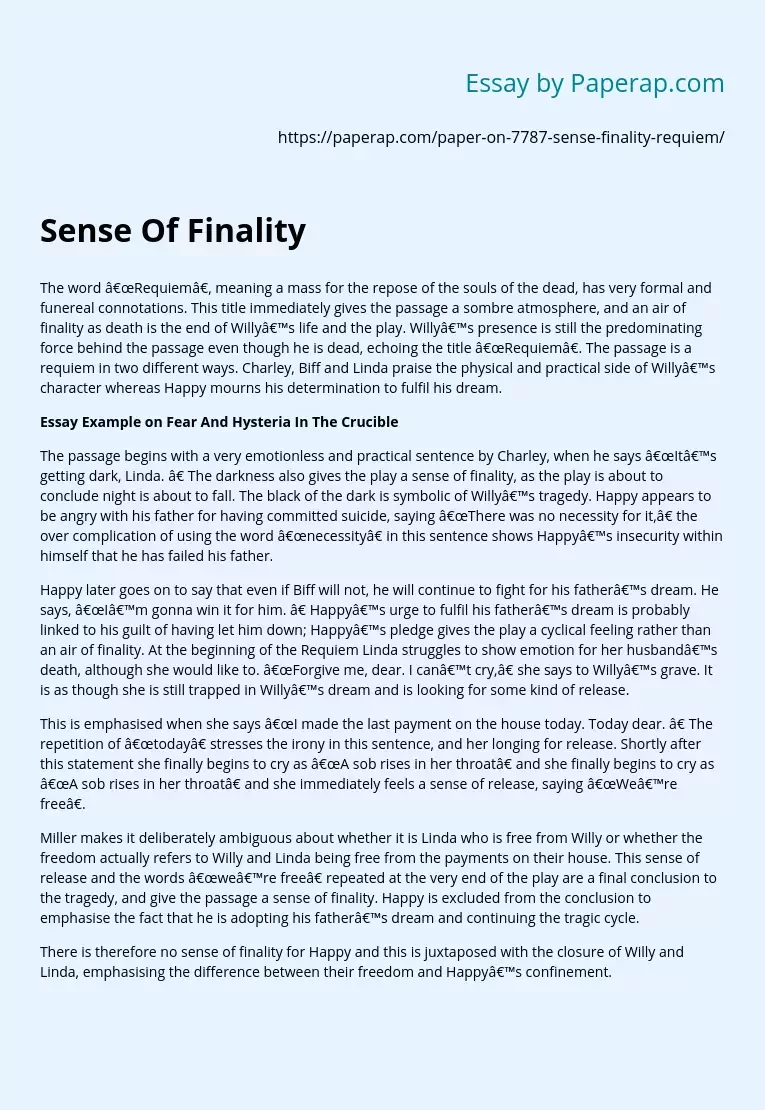Sense Of Finality
The word “Requiem”, meaning a mass for the repose of the souls of the dead, has very formal and funereal connotations. This title immediately gives the passage a sombre atmosphere, and an air of finality as death is the end of Willy’s life and the play. Willy’s presence is still the predominating force behind the passage even though he is dead, echoing the title “Requiem”. The passage is a requiem in two different ways. Charley, Biff and Linda praise the physical and practical side of Willy’s character whereas Happy mourns his determination to fulfil his dream.
Essay Example on Fear And Hysteria In The Crucible
The passage begins with a very emotionless and practical sentence by Charley, when he says “It’s getting dark, Linda. ” The darkness also gives the play a sense of finality, as the play is about to conclude night is about to fall. The black of the dark is symbolic of Willy’s tragedy.
Happy appears to be angry with his father for having committed suicide, saying “There was no necessity for it,” the over complication of using the word “necessity” in this sentence shows Happy’s insecurity within himself that he has failed his father.
Happy later goes on to say that even if Biff will not, he will continue to fight for his father’s dream. He says, “I’m gonna win it for him. ” Happy’s urge to fulfil his father’s dream is probably linked to his guilt of having let him down; Happy’s pledge gives the play a cyclical feeling rather than an air of finality.
At the beginning of the Requiem Linda struggles to show emotion for her husband’s death, although she would like to. “Forgive me, dear. I can’t cry,” she says to Willy’s grave. It is as though she is still trapped in Willy’s dream and is looking for some kind of release.
This is emphasised when she says “I made the last payment on the house today. Today dear. ” The repetition of “today” stresses the irony in this sentence, and her longing for release. Shortly after this statement she finally begins to cry as “A sob rises in her throat” and she finally begins to cry as “A sob rises in her throat” and she immediately feels a sense of release, saying “We’re free”.
Miller makes it deliberately ambiguous about whether it is Linda who is free from Willy or whether the freedom actually refers to Willy and Linda being free from the payments on their house. This sense of release and the words “we’re free” repeated at the very end of the play are a final conclusion to the tragedy, and give the passage a sense of finality. Happy is excluded from the conclusion to emphasise the fact that he is adopting his father’s dream and continuing the tragic cycle.
There is therefore no sense of finality for Happy and this is juxtaposed with the closure of Willy and Linda, emphasising the difference between their freedom and Happy’s confinement.
Sense Of Finality. (2019, Nov 27). Retrieved from https://paperap.com/paper-on-7787-sense-finality-requiem/

